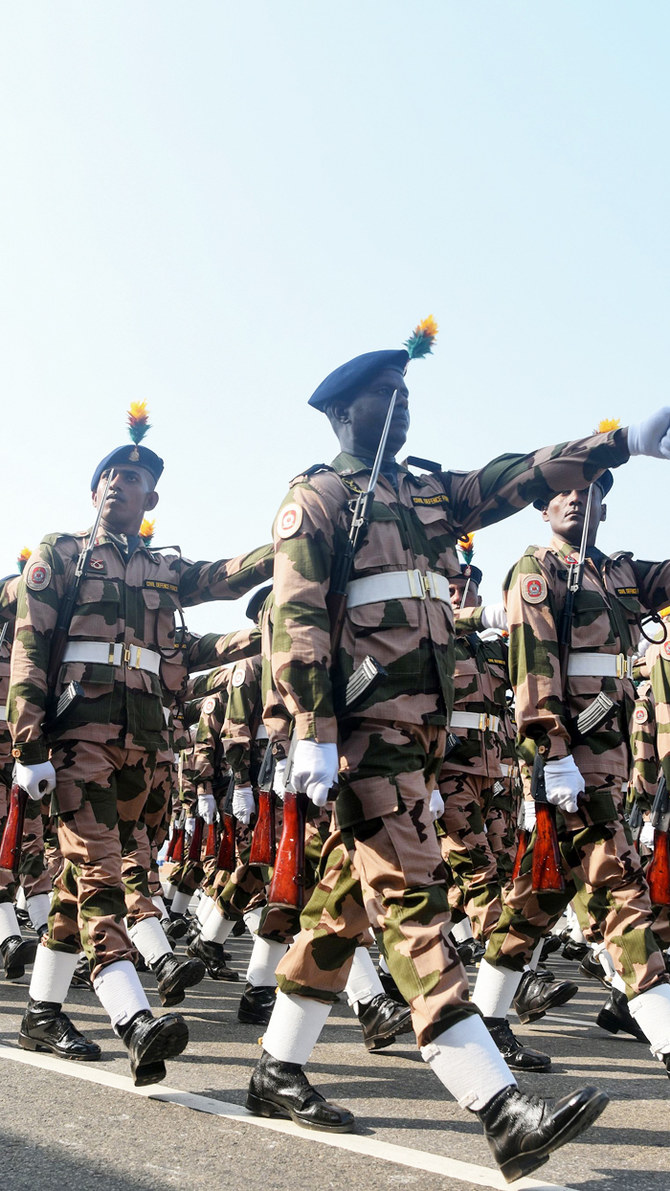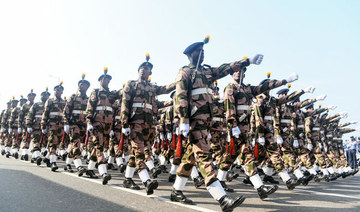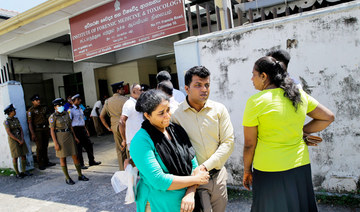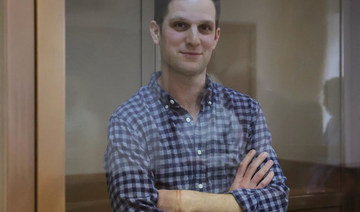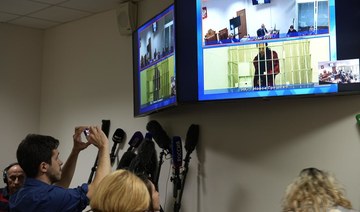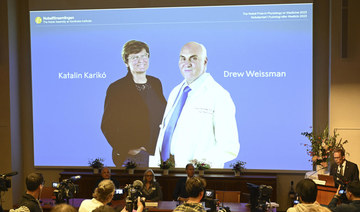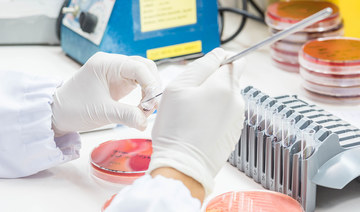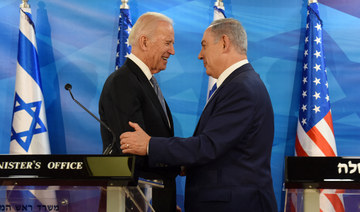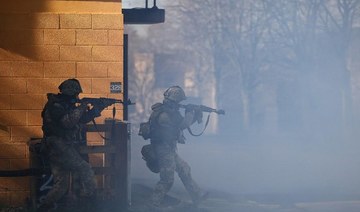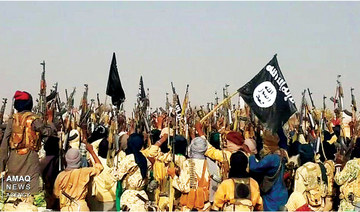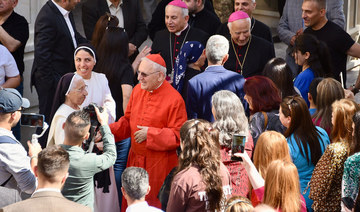COLOMBO, Sri Lanka: Sri Lanka’s president gave the military sweeping police powers starting Tuesday in the wake of the Easter bombings that killed nearly 300 people, while officials disclosed that intelligence agencies had warned weeks ago of the possibility of an attack by the radical Muslim group blamed for the bloodshed.
The suicide bombings struck three churches and three luxury hotels Sunday in the island nation’s deadliest violence since a devastating civil war ended in 2009. The government shut down some social media, armed security forces patrolled the largely deserted, central streets in the capital of Colombo, and a curfew went into effect.
The military was given a wider berth to detain and arrest suspects — powers that were used during the civil war but withdrawn when it ended.
Prime Minister Ranil Wickremesinghe said he feared the massacre could unleash instability and he vowed to “vest all necessary powers with the defense forces” to act against those responsible.
Adding to the tension, three unexploded bombs blew up Monday inside a van parked near one of the stricken churches as police were trying to defuse them, sending pedestrians fleeing in panic. No injuries were reported. Dozens of detonators were discovered near Colombo’s main bus depot, but officials declined to say whether they were linked to the attacks.
The government blocked access to Facebook, WhatsApp and Instagram after the blasts, creating confusion and doing little to reassure residents and visitors that the danger had passed.
A nationwide state of emergency was scheduled to begin at midnight Monday (0630 GMT; 2:30 p.m. EDT) the president’s office said, following the attacks that killed at least 290 people, with more than 500 wounded, according to police spokesman Ruwan Gunasekara. The three stricken hotels and one of the churches, St. Anthony’s Shrine, are frequented by tourists, and dozens of foreigners were among the dead.
Tourism Minister John Amaratunga said 39 foreigners were killed, although the foreign ministry put out a different figure, saying the number of dead was 31.
The US State Department confirmed that at least four Americans were among the dead and several others were seriously wounded, but it did not release any identities. The Sri Lankan government said other foreigners killed were from the UK, Bangladesh, China, India, France, Japan, the Netherlands, Portugal, Saudi Arabia, Spain, Turkey and Australia.
A national day of mourning was declared for Tuesday.
International intelligence agencies had warned that the little-known group, National Thowfeek Jamaath, was planning attacks, but word apparently didn’t reach the prime minister’s office until after the massacre, exposing the continuing political turmoil in the highest levels of the Sri Lankan government.
Health Minister Rajitha Senaratne said the intelligence agencies began issuing the warnings on April 4; the defense ministry wrote to the police chief with information that included the group’s name; and police wrote April 11 to the heads of security of the judiciary and diplomatic security division.
President Maithripala Sirisena, who was out of the country Sunday, had ousted Prime Minister Ranil Wickremesinghe in October and dissolved the Cabinet. The Supreme Court later reversed his actions, but the prime minister has not been allowed into meetings of the Security Council since October, which meant he and his government were in the dark about the intelligence.
It was not immediately clear what action, if any, was taken after the threats. Authorities said they knew where the group trained and had safe houses, but did not identify any of the suicide bombers, whose bodies were recovered, or the two dozen other suspects taken into custody.
All the bombers were Sri Lankans, but authorities said they strongly suspected foreign links, Senaratne said.
Also unclear was a motive. The history of Buddhist-majority Sri Lanka, a country of 21 million including large Hindu, Muslim and Christian minorities, is rife with ethnic and sectarian conflict.
In the civil war, the Tamil Tigers, a powerful rebel army known for using suicide bombers, was crushed by the government and had little history of targeting Christians. While anti-Muslim bigotry fed by Buddhist nationalists has swept the country recently, there is no history of Islamic militancy. Its small Christian community has seen only scattered incidents of harassment.
Two other government ministers also alluded to advance knowledge. Telecommunications Minister Harin Fernando tweeted: “Some intelligence officers were aware of this incidence. Therefore there was a delay in action. Serious action needs to be taken as to why this warning was ignored.” He said his father had heard of a possible attack as well and had warned him not to enter popular churches.
Mano Ganeshan, the minister for national integration, said his security officers had been warned by their division about the possibility that two suicide bombers would target politicians.
Cardinal Malcolm Ranjith, the archbishop of Colombo, said the attacks could have been thwarted.
“We placed our hands on our heads when we came to know that these deaths could have been avoided. Why this was not prevented?” he said.
The coordinated blasts took place in the morning at St. Anthony’s and the Cinnamon Grand, Shangri-La and Kingsbury hotels in Colombo, as well as the two churches outside Colombo. They collapsed ceilings and blew out windows, killing worshippers and hotel guests, and leaving behind scenes of smoke, soot, blood, broken glass, screams and wailing alarms.
A few hours later, two more blasts occurred just outside Colombo, one at a guesthouse where two people were killed, the other near an overpass, said Brig. Sumith Atapattu, a military spokesman.
Also, three police officers were killed while searching a suspected safe house on the outskirts of Colombo when its occupants apparently detonated explosives to prevent arrest, authorities said.
A pipe bomb with 50 kilograms (110 pounds) of explosives was found and defused late Sunday on a road to the international airport, said air force Group Capt. Gihan Seneviratne. It was powerful enough to have caused damage in a 400-meter (400-yard) radius, he said.
A morgue worker in Negombo, outside Colombo, where St. Sebastian’s Church was targeted, said many bodies were hard to identify because of the blasts. He spoke on condition of anonymity because he was not authorized to talk to the media.
Nilantha Lakmal, a 41-year-old businessman who took his family to St. Sebastian’s for Mass, said they all escaped unharmed, but he remained haunted by images of bodies being taken from the sanctuary.
At the Shangri-La Hotel, one witness said “people were being dragged out” after the blast.
“There was blood everywhere,” said Bhanuka Harischandra, 24, of Colombo, a founder of a tech marketing company who was going to the hotel for a meeting. “People didn’t know what was going on. It was panic mode.”
The scale of the violence recalled the worst days of the civil war, when the Tamil Tigers, from the ethnic Tamil minority, sought independence from the Sinhalese-dominated country. The Sinhalese are largely Buddhist. The Tamils are Hindu, Muslim and Christian. Sri Lanka, off the southern tip of India, is about 70% Buddhist. In recent years, tensions have soared between hard-line Buddhist monks and Muslims.
Two Muslim groups in Sri Lanka condemned the church attacks, and Pope Francis expressed condolences at the end of his traditional Easter blessing in Rome. The United Nations’ most powerful body, the Security Council, also denounced the “heinous and cowardly terrorist attacks.”
US Secretary of State Mike Pompeo said in Washington that he spoke to the prime minister and offered assistance. Later, the FBI said it was helping with the investigation.
“This is America’s fight, too,” he said. “We also stand with millions of Sri Lankans who support the freedom of their fellow citizens to worship as they please. We take confidence in knowing that not even atrocities like this one will deter them from respecting religious freedom.”
Sri Lanka military gets special powers after deadly bombings
Sri Lanka military gets special powers after deadly bombings
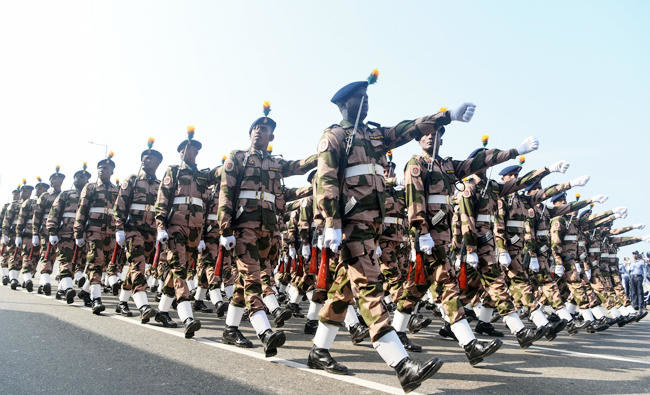
- Two Muslim groups in Sri Lanka condemned the church attacks, and Pope Francis expressed condolences at the end of his traditional Easter blessing in Rome
- A pipe bomb with 50 kilograms (110 pounds) of explosives was found and defused late Sunday on a road to the international airport, said air force Group Capt. Gihan Seneviratne
Anger among Ukrainians in Poland as Kyiv halts passport renewals

The agency issuing passports to Ukrainian residents in Warsaw blamed a “technical error” for the problems, not the new directive from Kyiv
WARSAW: Hundreds of Ukrainians crammed up against a closed passport office in Warsaw on Wednesday, furious over Kyiv’s suspension of consular services for fighting-aged men in a bid to force them to return home and bolster troop numbers.
Ukrainian authorities said Tuesday that they were “temporarily” blocking men aged 18 to 60 from accessing consular services, after Foreign Minister Dmytro Kuleba said they were letting compatriots fight in their place on the front lines.
“Staying abroad does not relieve a citizen of his or her duties to the homeland,” Kuleba posted on social media.
The move is seen as part of Kyiv’s efforts to reinforce its army as soldiers struggle to hold positions against Russia.
But in Poland, which hosts hundreds of thousands of Ukrainians — both refugees from the conflict and those who were already living in the country when Russia invaded — there was anger among those who felt they were being unfairly targeted.
“This is a fight against people who are fleeing the army,” said Maksym, a 38-year-old truck driver, one of dozens of people who had come hoping to collect a new passport they had applied for — so far unsuccessfully.
“We are not asked on what grounds we went abroad... Why am I a draft dodger if I went abroad legally?” he told AFP.
Some said they had spent the whole night queueing up.
The agency issuing passports to Ukrainian residents in Warsaw blamed a “technical error” for the problems, not the new directive from Kyiv.
A heated argument broke out at the passport office when women accused a group of men of blocking the entrance and stopping other people who wanted to submit applications.
Pavlo Lyashenko, a 35-year-old entrepreneur standing nearby as the scene unfolded, told AFP that “The state has put me in a situation in which I have no way out.”
He said he had received a text message saying his passport was ready, but believed it was now being withheld from him.
“The doors are blocked. They are afraid that if I come inside, I will not leave until I receive my passport. I know it’s there,” Lyashenko said.
As the crowds swelled through the morning, the agency called in the Polish police as a precaution. Officers spoke with those queueing up, but did not otherwise intervene.
Diana Petrenko, deputy director of the Warsaw passport office, insisted that technical issues were to blame.
“Unfortunately, the documents are not issued due to technical reasons,” she told AFP, refusing to elaborate on the nature of the alleged glitch.
Ukraine’s foreign ministry said Tuesday that the suspension applied only to new applications and that any requests submitted before then would be honored.
Lyashenko, the entrepreneur, who said he had left Ukraine long before the start of the war, said he worried he could end up in a legal grey zone, abroad but without a valid passport.
“I think that our state is simply driving people to the point that we will all need to do this,” he said.
Although there are some exceptions, most Ukrainian men have been barred from leaving the country since Russia invaded in February 2022 — meaning that many who will now be unable to submit new passport applications had already been living away for years.
According to Ukrainian media, hundreds of thousands of working-age men have sought refuge in EU countries since the start of the war.
The consular service suspensions, which come as Kyiv scrambles to recruit troops, is widely seen as an attempt to force fighting-age men back to Ukraine.
President Volodymyr Zelensky’s government also recently passed a new mobilization law designed to help lift army numbers, and lowered the age limit for mobilization to 25 from 27.
The mobilization law, due to come into force mid-May, also toughens penalties against draft dodgers and forces men to keep their military registration up to date.
The foreign ministry said the suspension of consular services was a temporary measure needed to “resolve technical issues” linked with the implementation of the new law.
Bogdan, a Ukrainian truck driver who declined to give his full name, said he was stuck waiting for a second day straight at the Warsaw passport office.
“I drove 700 kilometers (435 miles) to get my passport because I received a text message that I could pick it up,” the 27-year-old said.
“No one gives the passport. What are our next steps?” he said. “What do we have to do to simply be given our documents that we paid for?“
A Russian deputy defense minister is ordered jailed pending trial on bribery charges
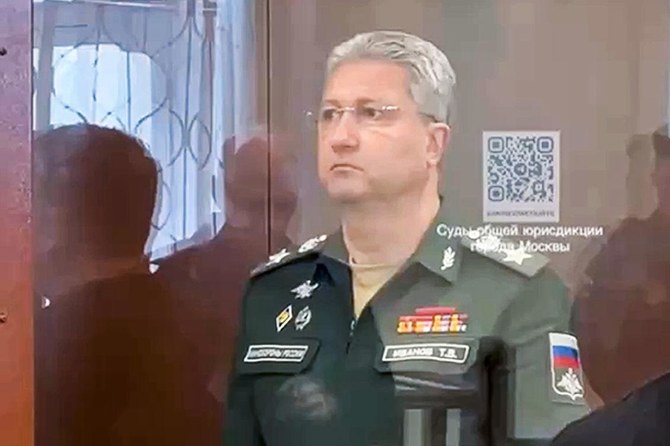
- Timur Ivanov, one of 12 deputy defense ministers, appeared in Moscow’s Basmany court Wednesday wearing his military uniform
- The committee gave no further information, apart from saying Ivanov is suspected of taking an especially large bribe — an offense punishable by up to 15 years in prison
MOSCOW: A Russian deputy defense minister in charge of military construction projects and accused of living a lavish lifestyle was ordered jailed Wednesday pending an investigation and trial on charges of bribery, court officials said in a statement.
Timur Ivanov, one of 12 deputy defense ministers, appeared in Moscow’s Basmany court Wednesday wearing his military uniform. The ally of Defense Minister Sergei Shoigu was arrested Tuesday evening, Russia’s Investigative Committee said in a statement.
The committee gave no further information, apart from saying Ivanov is suspected of taking an especially large bribe — an offense punishable by up to 15 years in prison.
The Kremlin rejected some Russian media reports that Ivanov was suspected of treason.
Ivanov, 48, was sanctioned by both the United States and European Union in 2022 after Russia’s full-scale invasion of Ukraine.
According to a court statement, investigators told the judge that Ivanov had conspired with third parties to receive a bribe in the form of unspecified property services “during contracting and subcontracting work for the needs of the Ministry of Defense.”
An acquaintance of Ivanov’s, identified as Sergei Borodin, also was arrested and ordered jailed pending an investigation and trial on the same charges, court officials said. Both men are to remain in custody until at least June 23.
According to the Defense Ministry’s website, Ivanov was appointed in 2016 by a presidential decree. He oversaw property management, housing and medical support for the military, as well as construction projects.
Russia’s state news agency RIA Novosti quoted Kremlin spokesman Dmitry Peskov as saying that Shoigu and President Vladimir Putin were informed of Ivanov’s arrest, which comes as Moscow’s war in Ukraine grinds through its third year.
Peskov dismissed Russian media reports that the corruption allegations against Ivanov were intended to obscure additional allegations of high treason.
Independent Russian news outlet reported that the bribery charges were intended to hide more serious charges of treason and avoid scandal, citing two unidentified sources close to the Federal Security Service, or FSB.
Peskov described the reports as speculation. “There are a lot of rumors. We need to rely on official information,” he told journalists.
Ivanov’s lawyer also denied any other charges, telling RIA Novosti that he faced only bribery allegations.
Before his arrest, Ivanov was seen attending a meeting with Shoigu and other military brass.
Russian media reported that he oversaw some of the construction in Mariupol — a Ukrainian port city that was devastated by bombardment and occupied by Russian forces early in the war.
Zvezda, the official TV channel of the Russian military, reported in summer 2022 that the ministry was building an entire residential block in Mariupol and showed Ivanov inspecting construction sites and newly erected residential buildings.
That same year, the team of the late Alexei Navalny, Russia’s most prominent opposition leader and anti-corruption campaigner, alleged Ivanov and his family had been enjoying luxurious trips abroad, lavish parties and owning elite real estate. The activists also alleged that Ivanov’s wife, Svetlana, divorced him in 2022 to avoid sanctions and continued living a lavish lifestyle.
Commenting on Ivanov’s case, Navalny’s ally Maria Pevchikh said on social platform X: “It’s a good day today.”
The prosecution of high-level officials for corruption remains relatively rare in Russia.
The most recent arrest in April 2023 saw former Deputy Culture Minister Olga Yarilova charged with embezzling more than 200 million rubles ($2.2 million). Yarilova, who held her post between 2018 and 2022, is on trial and facing a seven-year jail term.
Former Economics Minister Alexei Ulyukayev received an eight-year prison sentence in 2017 for accepting a $2 million bribe from one of Putin’s top associates. The high-profile trial was widely seen as part of infighting between Kremlin clans. Ulyukayev, now 68, was granted early release from prison in May 2022.
Vaccines save at least 154 million lives in 50 years: WHO
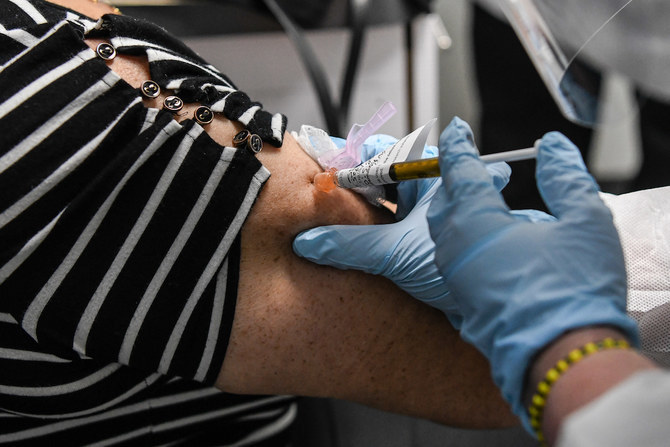
- That is the equivalent of six lives saved every minute of every year of the half century, the UN health agency said
- “Vaccines are among the most powerful inventions in history, making once-feared diseases preventable,” WHO chief Tedros Adhanom Ghebreyesus said
GENEVA: Global immunization efforts have saved at least 154 million lives in the past 50 years, the World Health Organization said Wednesday, adding that most of those to benefit were infants.
That is the equivalent of six lives saved every minute of every year of the half century, the UN health agency said.
In a study published in the Lancet, WHO gave a comprehensive analysis of the impact of 14 vaccines used under the Expanded Programme on Immunization (EPI), which celebrates its 50th anniversary next month.
“Vaccines are among the most powerful inventions in history, making once-feared diseases preventable,” WHO chief Tedros Adhanom Ghebreyesus said in a statement.
“Thanks to vaccines, smallpox has been eradicated, polio is on the brink, and with the more recent development of vaccines against diseases like malaria and cervical cancer, we are pushing back the frontiers of disease,” he said.
“With continued research, investment and collaboration, we can save millions more lives today and in the next 50 years.”
The study said infants accounted for 101 million of the lives saved through immunization over the five decades.
“Immunization was the single greatest contribution of any health intervention to ensuring babies not only see their first birthdays but continue leading healthy lives into adulthood,” WHO said.
Over 50 years, vaccines against 14 diseases — diphtheria, Haemophilus influenza type B, hepatitis B, Japanese encephalitis, measles, meningitis A, pertussis, invasive pneumococcal disease, polio, rotavirus, rubella, tetanus, tuberculosis, and yellow fever — had directly contributed to reducing infant deaths by 40 percent, the study found.
For Africa, the reduction was more than 50 percent, it said.
The vaccine against measles — a highly contagious disease by a virus that attacks mainly children — had the most significant impact.
That jab accounted for 60 percent of the lives saved due to immunization, according to the study.
The polio vaccine means that more than 20 million people are able to walk today who would otherwise have been paralyzed.
The study also showed that when a vaccine saves a child’s life, that person goes on to live an average of 66 years of full health on average — with a total of 10.2 billion full health years gained over the five decades.
“These gains in childhood survival highlight the importance of protecting immunization progress,” WHO said, pointing to accelerating efforts to reach 67 million children who missed at least one vaccination during the Covid pandemic.
Sunak, Scholz vow support for Ukraine for ‘as long as it takes’
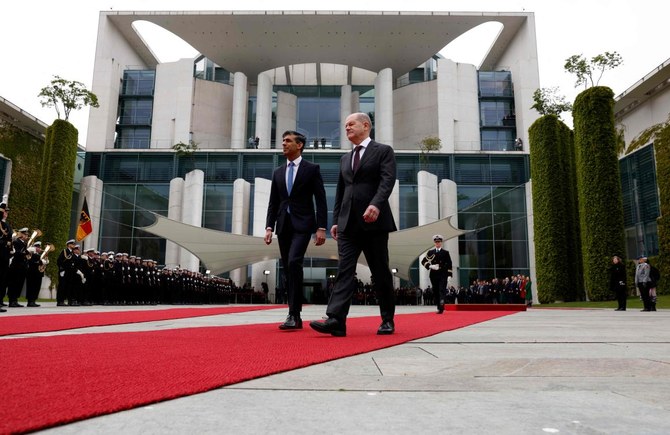
- “We’re defending the values that are incredibly important to us,” the UK leader added
- Sunak embarked on a two-day trip to Europe designed to get the spotlight back on Ukraine after months of world attention on Israel’s war against Hamas in Gaza
BERLIN: The leaders of Britain and Germany pledged Wednesday to back Ukraine in its war with Russia for “as long as it takes,” but the German chancellor doubled down on his refusal to deliver long-range Taurus missiles to Kyiv.
UK Premier Rishi Sunak was on his first trip to the German capital since becoming prime minister 18 months ago, after visiting Poland on Tuesday where he pledged additional money for Kyiv and announced plans to boost UK defense spending.
“We’re united on wanting to support Ukraine for as long as it takes,” Sunak told reporters, adding that Russian President Vladimir Putin’s aggression must “end in failure.”
“We’re defending the values that are incredibly important to us,” the UK leader added, standing alongside German Chancellor Olaf Scholz during a press conference at Germany’s chancellery.
Sunak embarked on a two-day trip to Europe designed to get the spotlight back on Ukraine after months of world attention on Israel’s war against Hamas in Gaza.
In Poland, he pledged an additional £500 million ($617 million) for Ukraine, taking the amount of money the UK has contributed to Ukraine’s war effort to £12 billion.
Kyiv has been pleading with allies to ramp up supplies of ammunition and air defenses desperately needed to repel relentless Russian attacks.
US lawmakers eased the pressure last weekend by unblocking a $61-billion military aid package for Kyiv following six months of political wrangling.
But EU defense and foreign ministers insist that Europe must still speed up its deliveries of arms to Ukraine.
Germany has answered Kyiv’s call in recent days by saying it would send an extra Patriot air defense system to Ukraine.
But Scholz again resisted calls to send long-range Taurus missiles, which Ukraine desperately wants but which Germany fears would escalate the conflict.
“My decision is very clear” on not sending the Taurus, said Scholz.
“But my decision is also very clear that we will continue to be the biggest supporter of Ukraine in Europe,” he added.
Sunak hailed “a new chapter” in relations between Britain and Germany as they announced plans for a joint endeavour to develop remote-controlled Howitzer artillery systems that will be fitted to Boxer armored vehicles.
“At this dangerous moment for the world, the UK and Germany are standing side by side to preserve security and prosperity at home and across our continent,” Sunak said before landing in Berlin.
In Warsaw, the UK PM pledged to gradually increase UK defense spending to 2.5 percent of GDP by 2030 as NATO countries face pressure to raise defense expenditure in the face of these global threats.
Sunak said that the West was facing its most dangerous period since the end of the Cold War, with Russia’s assault on Ukraine in its third year, but also the threat of escalation in the Middle East.
More of NATO’s European members — including heavyweights France and Germany — have increased their defense spending recently to meet the alliance’s two percent of GDP target.
Sunak refused to say that NATO should increase its target to 2.5 percent but added: “We recognize we need to do more,” adding: “I do believe we are in a world where defense spending is rising.”
EU chief Ursula von der Leyen recently warned that European countries need to boost defense budgets and Brussels is set to come up with further proposals by a summit of EU leaders in June.
It has put forward a 1.5-billion-euro ($1.6-billion) strategy to step up defense production, but officials say this is nowhere near sufficient.
The UK, which quit the European Union in early 2020, is among some 20 countries to have signed up to Germany’s air defense project called the European Sky Shield Initiative.
The project would involve joint procurement for short-, medium- and long-range systems, including the German-made Iris-T, the American Patriot system and the US-Israeli Arrow 3.
France has so far declined to sign up to the pact, with officials there arguing instead for an air defense system using European equipment.
Germany charges six suspected Daesh-K members over attack plots
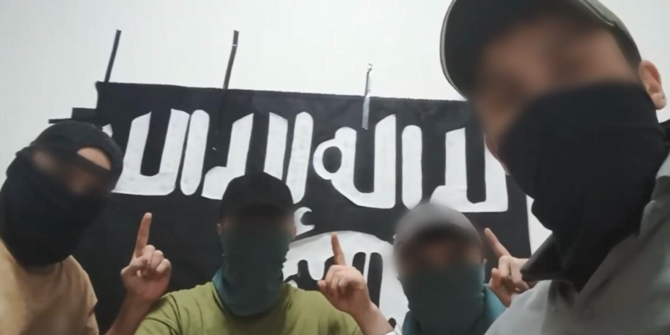
- The suspects are charged with founding a terrorist organization, among other things
- They intended to carry out high-profile attacks in Germany and Western Europe
BERLIN: Germany has charged six foreign nationals for allegedly plotting terrorist attacks on behalf of the Daesh Province of Khorasan (Daesh-K), the federal prosecutor’s office said on Wednesday.
The suspects, identified as Tajik citizens Mukhammadshujo A., Nuriddin K., Shamshud N., Said S., Raboni Z., and Kyrgyz citizen Abrorjon K., are charged with founding a terrorist organization, among other things.
They intended to carry out high-profile attacks in Germany and Western Europe but had no concrete plan when law enforcement intervened, according to the statement.
The suspects, who were arrested in July last year, had been in touch with Daesh-K, the Afghan offshoot of Daesh, which claimed responsibility for a mass shooting in Moscow last month in which at least 137 people were killed.
According to investigators, the suspects arrived in Germany via Ukraine after war broke out there in spring 2022, and formed a terrorist cell together with another member from the Netherlands.
They met regularly to discuss their intentions and scouted potential locations in Germany, the prosecutors’ statement said.



